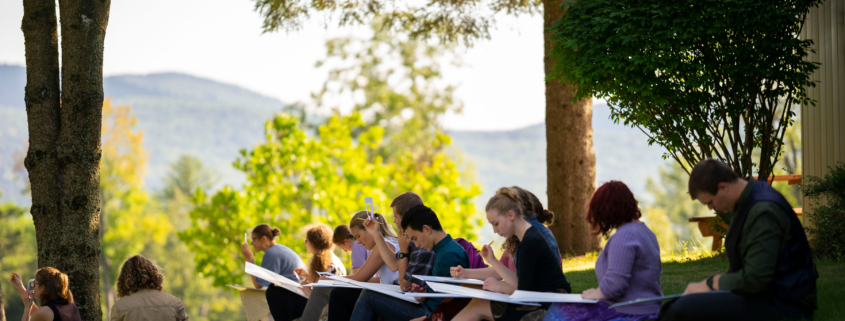Scholars Tout Unique, Catholic, Liberal Arts Education at Magdalen College

Dr. Anthony Esolen

Dr. Ryan Messmore
The Cardinal Newman Society was honored to recently interview two scholars who have found a home at Magdalen College of the Liberal Arts in Warner, N.H.: Dr. Anthony Esolen, a renowned translator and professor of literature and a prolific writer, together with Dr. Ryan Messmore, a champion of Catholic, liberal arts education and president of the College.
Recommended in The Newman Guide, Magdalen College provides an education unlike that provided by the typical Catholic college today. Drs. Esolen and Messmore discussed the special value of a true Catholic, liberal arts higher education.
Newman Society: What is the special value that Magdalen College of the Liberal Arts provides students in the 21st century?
Dr. Anthony Esolen: We are “building soil” at Magdalen: making the cultural ground rich again. We honor and we study the great and good works from the past, not just as detached “great books” to be read and put on a shelf somewhere. Rather, we engage them as embedded in a long history of thought and art and human institutions, as bearing the marks of the cultures that produced them, and that have contributed in their own ways, and in irreplaceable ways, to our civilization. Our four-year-long Humanities course is, in this regard, unique in the nation. Nor do we read the great pagan authors to discover what they got wrong. They are giants, and though they did not see the truth of God or know Christ, still, what they saw, they saw, and we are not too proud as either moderns or as Christians to learn from what they saw.
Dr. Ryan Messmore: To help (in Dr. Esolen’s words) “make the cultural ground rich again,” we not only approach certain texts and authors with the respect they deserve, but we also do so in an incarnational way—meaning face-to-face, in-person, in the context of a faithful learning community. Many college students today—and especially over the last year and a half—have suffered from the prolonged amount of time they spend on screens. This has impacted not only their academic learning and their social/emotional health, but also their worship. In an impersonal world that stokes fear and divisiveness, Magdalen offers a different mode of living and learning. We prioritize small-group conversation; we take the sacraments seriously; we celebrate large feasts and holidays as well as small, campus-wide traditions; faculty and staff eat and work and worship along students. In so doing, we daily embody the sort of cultural richness that Dr. Esolen rightly notes is hard to find in our larger culture.
Newman Society: What do you think most of American education gets wrong with regard to the liberal arts—and especially the liberal arts within a Catholic education?
Dr. Anthony Esolen: Most of American education gets everything wrong with regard to the liberal arts. First, since they do not believe in any transcendent truth, they cut the liberal arts off at the knees; there is simply nowhere for the arts to go, other than to turn back in on themselves in cynicism or in angry political action. If you do not believe that it is good in itself to know things, and to behold beauty, and to share with others what you have seen and come to love, so as to enrich and ennoble human life, then it seems to me that you can have no use for Michelangelo, Shakespeare, Bach and the rest—no “use,” unless you reduce them to some pallid shadow of themselves, and say that it is alright to read Shakespeare because it will assist you in writing up office memoranda. But that is not why a human being reads Shakespeare. To sum it up, I’d say that the American approach to the liberal arts is utilitarian at best and therefore servile, not free; and that otherwise it turns the liberal arts into political action, which is worse than servile. It is treacherous.
Dr. Ryan Messmore: I would add that many educational institutions either do not take a strong stand on, or perhaps answer problematically, the fundamental question of the liberal arts: What does it mean to be human? For example, what is our nature as male and female? What is our purpose as persons created in the image of God?
Let’s take each possibility in turn. 1) When institutions shy away from putting a stake in the ground on such questions, they become susceptible to promoting the latest ideology or political agenda (as Dr. Esolen noted). And when institutions won’t commit themselves to what it means to be human, they don’t know what it is they are claiming to liberate. 2) When modern universities do take a stand, they often promote a vision of human beings as simply autonomous, rights-bearing individuals with no transcendent purpose—with no deeper meaning or identity other than the identity they choose for themselves.
What suffers is, again, true freedom. There’s much to liberate the student from, but not much to liberate the student for. The liberal arts should liberate students from ignorance and utilitarianism and liberate them to become fully flourishing human persons.
Newman Society: How do students apply the liberal arts to lead happy and productive lives after graduation?
Dr. Anthony Esolen: Students who are grounded in the liberal arts will be much better readers and writers than their peers will be, and since those skills are rare in our time, that means that a good reader or writer will not find it hard to get well-remunerated work. Mainly, though, we are talking about the formation of souls, the enriching and elevation of the mind.
Dr. Ryan Messmore: Magdalen students enter life after graduation with certain habits and a certain framework that catalyze true happiness. Dr. Esolen mentioned some of those habits, which entail good communication, but their Catholic liberal arts education also equips them with habits of close reading, critical thinking and faithful living. What do I mean by that? Our students have developed the habit of taking time for prayer and daily Mass; they have developed the habit of putting others first and serving a larger good; they have developed the habit of asking good questions and discerning what they hear in response. When they approach something new in life, they do so with wonder and curiosity, anticipating that it has a deeper purpose and meaning than what others might see at first glance. These formational habits and ways of viewing the world are perhaps the most crucial things an education can provide students.

Photo via Magdalen College.
Newman Society: Do your alumni find success?
Dr. Anthony Esolen, Dr. Ryan Messmore: Yes, but we both think it’s important to define the term “success.” At the level of employment, Magdalen students go on to find work and satisfaction in many fields—from finance and law, to I.T. and education, to healthcare and journalism. In addition, many continue on to earn higher degrees in graduate school. At the deeper level of relationships, a large percentage of our graduates get married (a larger percentage than is typical of the rest of their demographic!) and they raise strong families. At the all-important level of character, our graduates tend to succeed in prioritizing what is important in life—in Augustine’s terms, how to love the right things in the right way. That’s the path that future saints travel, which is the ultimate standard of success!
Newman Society: Magdalen College is small, close-knit, friendly, and situated in the mountains of New England. For many students, that’s an ideal environment to study and grow in the Catholic faith. What kind of student flourishes at Magdalen College?
Dr. Anthony Esolen: Students who like being around people and who like to talk about all kinds of things—movies, music, art, language, the greenhouse, how to build a garage, Latin verbs—and who want to draw nearer to God and to their neighbors, by the beauty of worship and by the calm and steady work of the mind. We have a lot of fun here—and it shows. Meet our students for ten minutes and you will see!
Dr. Ryan Messmore: As Dr. Esolen alluded to, Magdalen is for a special kind of student. It’s not for those who want to design their own curriculum or spend their Friday nights drinking at a sorority party or cheering for a football team in a crowded stadium. Magdalen is for those who have an inkling that the world is enchanted with beauty and meaning and want an education that will help them explore it at a deeper level. It’s for those who prefer Dante’s Comedy and an O’Connor short story to a modern textbook. It’s for those who want to be inspired by sacred music and reverent liturgy. And it’s for those who want to learn from top-notch, faithful professors like Anthony Esolen!

